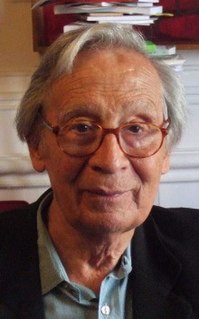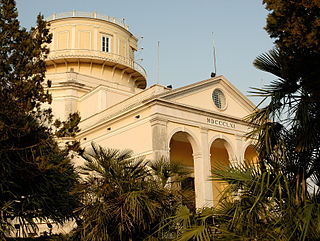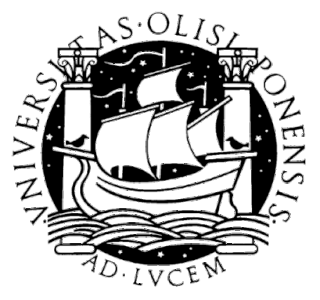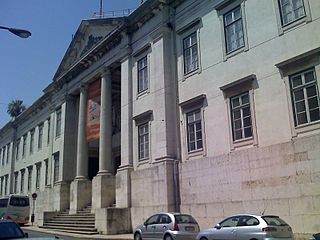
The University of Lisbon is a public research university in Lisbon, and the largest university in Portugal. It was founded in 2013, from the merger of two previous public universities located in Lisbon, the former University of Lisbon (1911–2013) and the Technical University of Lisbon (1930–2013). The history of a university in Lisbon dates back to the 13th century.

José Bonifácio de Andrada e Silva, in english: Joseph Boniface of Andrada and Silva ; was a Brazilian statesman, naturalist, mineralist, professor and poet, born in Santos, São Paulo, then part of the Portuguese Empire. He was one of the most important mentors of Brazilian independence, and his actions were decisive for the success of Emperor Pedro I. He supported public education, was an abolitionist and suggested that a new national capital be created in Brazil's underdeveloped interior. His career as naturalist was marked by the discovery of four new minerals.

Academia Brasileira de Letras (ABL) is a Brazilian literary non-profit society established at the end of the 19th century. The first president, Machado de Assis, declared its foundation on December 15, 1896, with the by-laws being passed on January 28, 1897. On July 20 of the same year, the academy started its operation.

Urbano Tavares Rodrigues, GCIH was a Portuguese professor of literature, a literary critic and a fiction writer, winner of many literary prizes.

João de Loureiro was a Portuguese Jesuit missionary and botanist.
Alfredo Bosi was a Brazilian historian, literary critic, and professor. He was a member of the Academia Brasileira de Letras, occupying Chair number 12. One of his most famous books is História Concisa da Literatura Brasileira, widely used in Brazilian universities in literature courses. Bosi also wrote several studies about Italian literature and about major Brazilian writers as well as essays on the field of hermeneutics.

The Lisbon Academy of Sciences is Portugal's national academy dedicated to the advancement of sciences and learning, with the goal of promoting academic progress and prosperity in Portugal. It is one of Portugal's most prestigious scientific authorities and the official regulator of the Portuguese language in Portugal, through its Class of Letters.

The Lisbon Astronomical Observatory is an astronomical observatory located in Tapada da Ajuda, in the civil parish of Alcântara, municipality of Lisbon. Recognized internationally for its quality of work in the field of positioning astronomy, in 1992, it became a dependency of the University of Lisbon, responsible for scientific and historical research, along with media relations.
The Portuguese Language Orthographic Agreement of 1990 is an international treaty whose purpose is to create a unified orthography for the Portuguese language, to be used by all the countries that have Portuguese as their official language. It was signed in Lisbon, on 16 December 1990, at the end of a negotiation, begun in 1980, between the Sciences Academy of Lisbon and the Brazilian Academy of Letters. The signatories included official representatives from all of the Portuguese-language countries except East Timor, which was under Indonesian occupation at the time, but later adhered to the Agreement, in 2004.

José Eduardo Franco is a Portuguese historian, journalist, poet and essayist.

Msgr Sebastião Rodolfo Dalgado was an Indo-Portuguese Catholic priest, academic, university professor, theologian, orientalist and linguist.

The Galician Academy of the Portuguese Language is a learned institution dedicated to the advancement, study, and normalization of Galicia's language. The academy promotes Reintegrationism, the concept that the language spoken in Galicia is in fact merely a dialect of the Portuguese language and should be standardized to the international Portuguese norms of language.
CAPLE is a certificate of proficiency in Standard European Portuguese as a second language offered in Portugal and 45 other countries and territories. The official CAPLE examinations and certificates/diplomas are developed, delivered, and accredited by a tri-partite collaboration in Portugal between the School of Arts and Humanities at the University of Lisbon and the Instituto Camões, which administers the examination procedures on behalf of the Portuguese Ministry of Foreign Affairs.

The University of Lisbon was a public university in Lisbon, Portugal. It was founded in 1911 after the fall of the Portuguese monarchy and was later integrated in the new University of Lisbon along with the former Technical University of Lisbon. The history of a university in Lisbon dates back to the 13th century.

The National Museum of Natural History and Science in Lisbon, Portugal is the country's main museum focusing on nature. The museum functions under the University of Lisbon.
Francisco José Tenreiro was a São Toméan geographer and poet who lived during the colonial era. He was taught at the Overseas Political and Social Sciences Institute, now known as the Instituto Superior de Ciências Sociais e Políticas of the University of Lisbon.

Inocêncio Francisco da Silva, often referred simply as Innocencio was the most distinguished Portuguese bibliographer, who compiled seven centuries' worth of information about Portuguese-language authors up to the mid-19th century. He authored the monumental Diccionario Bibliographico Portuguez, which was continued by others following his death.

Albert Arthur Alexandre Girard was an American-born Portuguese naturalist. A scientific consultant to the oceanography enthusiast King Carlos I, Girard is noted for his important collaboration in the field of marine zoology during the King's deep-sea exploration campaigns in 1896–1907.
Arno Wehling was born in 1947 in the city of Rio de Janeiro, son of Eugen Horst Theodor Wehling and Helena Wehling, born in Düsseldorf and Florianópolis, respectively. He is married to professor and historian Maria José Cavalleiro de Macedo Wehling, born in Belém do Pará, with whom he has published works and conducted research.
António Pereira Cândido de Figueiredo, usually referred to as Cândido de Figueiredo was a Portuguese lawyer and civil servant by trade who later became well-known as a writer, lexicographer, grammarian, and philologist specializing in the Portuguese language.














